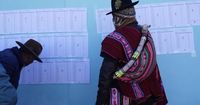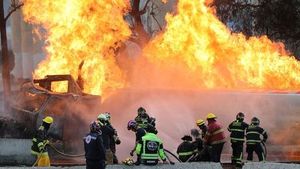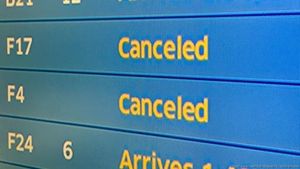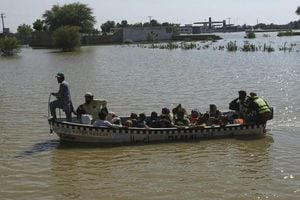Bolivia is on the cusp of a political transformation after a historic presidential election on August 17, 2025, shattered more than two decades of dominance by the left-leaning Movement Toward Socialism (MAS) party. The first round of voting, which failed to produce a clear winner, has set the stage for a dramatic runoff between two prominent opposition leaders: centrist Senator Rodrigo Paz and right-wing former president Jorge "Tuto" Quiroga. The runoff, scheduled for October 19, marks the first time since Bolivia's return to democracy in 1982 that the country will decide its leader in a second round.
According to BNamericas and the Los Angeles Times, the election was a clear repudiation of the MAS party, which has governed almost uninterrupted since Evo Morales swept to power in 2006 as part of Latin America's so-called "pink tide." The party's official candidate, Eduardo del Castillo, finished a distant sixth with just 3.2% of the vote, while Senate president Andrónico Rodríguez garnered only 8%. The MAS's poor showing is widely attributed to bitter infighting between President Luis Arce and Morales, as well as the country's worst economic crisis in four decades.
Rodrigo Paz, a senator and former mayor of Tarija, emerged as the surprise frontrunner with over 32% of the vote. Paz, who campaigned under the slogan "Capitalism for all," has promised to lower tariffs, reduce taxes, and make small loans more accessible to entrepreneurs. "Bolivia is looking for change, looking for renewal," Paz told the Associated Press after his win. "The vast majority of people have expressed that desire for renewal — merchants, the self-employed, transport workers, the great majority of this country."
Paz's rise was unexpected. He had trailed in the polls for weeks, but his partnership with Edman Lara, a social-media-savvy ex-police captain with evangelical backing, helped propel his campaign. As Lara put it to local media, "We did not invest millions, we invested in the people’s trust... While others spent fortunes on posters and TV spots, we trusted in the strength of the citizens and a message of unity."
Jorge Quiroga, a former president and a fixture of the Bolivian right, finished second with just over 26%. Businessman Samuel Doria Medina, who received 19.9% of the vote, has since pledged his support to Paz, signaling a potential consolidation of centrist and moderate forces ahead of the runoff. Under Bolivian election rules, a candidate must secure more than 50% of the vote, or 40% with a 10-point margin, to avoid a runoff. With neither threshold met, the contest now heads into uncharted territory.
The MAS party's collapse is as much a story of internal discord as it is of public discontent. Morales, barred from running by term limits and facing an arrest warrant over allegations of impregnating a 15-year-old girl while president, has retreated to his stronghold in Chapare. He denounced Rodríguez as a traitor and called on his supporters to cast null-and-void ballots in protest. The result? An unusually high 19% of votes were invalid, far above the typical 6% seen in Bolivian elections. Voting was mostly peaceful, though a dynamite stick exploded near the school where Rodríguez was set to vote, and pro-Morales crowds later assaulted him with bottles and rocks as he cast his ballot.
The economic backdrop to this political drama is dire. As Los Angeles Times reports, Bolivia's annual inflation has soared from 2% less than two years ago to a staggering 25% as of August 2025. Fuel shortages have paralyzed much of the country, and a lack of U.S. dollars for essential imports like wheat has crippled the economy. The construction sector expects to grow by just 2% in 2025, but even that modest forecast may be revised downward. The World Bank projects Bolivia's GDP will grow just 1.5% in 2025, well below the regional average.
Both runoff candidates recognize the urgent need for economic and energy reform, but their roadmaps diverge in important ways. Paz's plan, as outlined by BNamericas, calls for reactivating hydrocarbons exploration and production, promoting renewable energies, and offering legal and fiscal incentives to attract private investment. He wants to modernize the legal framework governing the energy sector, restructure state energy companies, and prioritize environmental safeguards and the protection of indigenous communities. The goal is to diversify Bolivia's energy matrix and reduce the risk of a looming energy crisis.
"Bolivia is facing a critical multidimensional situation, which has placed the economy, state institutions, and the judicial system on 'intensive care'," Paz's government plan reads. Experts have warned that without urgent investment and policy change, the country could face a severe food and energy crisis by 2030.
Quiroga's energy strategy is more market-oriented. He proposes raising domestic fuel prices to make currently unprofitable reserves viable, improving logistics, and liberalizing fuel imports. He also wants to target fuel subsidies to public transportation and the most vulnerable, use technology to combat smuggling, and incentivize gas production. Quiroga advocates for a competitive tax system, the promotion of biofuels, and a legislative push to ensure that at least 50% of Bolivia's electricity comes from renewable sources. "The situation in this sector today is worrying," Quiroga said. "We don't have sufficient gas reserves... if gas production doesn't increase, we won't have any energy."
The stakes for the October 19 runoff could hardly be higher. The outcome will determine not only the direction of Bolivia's economic recovery but also its foreign policy orientation. After years of alignment with China and Russia, the country now seems poised to reconcile with the United States and embrace a more open market economy.
For many Bolivians, this election represents a crossroads. As Álvaro Chipana, a resident of La Paz, told the Los Angeles Times, "People wanted something new, and, after not finding that in a radical on the right or someone who fully represented socialism, they have obviously opted for Paz. I think it’s a very good option."
With the MAS party fractured and its former leaders sidelined by scandal and infighting, the country is bracing for a new era. Whether Bolivia will embrace Paz's vision of inclusive capitalism or Quiroga's market-driven reforms remains to be seen. One thing is certain: the Bolivian people, weary from crisis and eager for change, now hold the future firmly in their hands.





